Indonesia Needs More “Climate Realists”

Photo: Aufar Satria.
You are a bright, young, up-and-coming next-generation leader of Indonesia—eager to be the hero of the world. You learn that climate change is the defining problem of your generation. You see news about destroyed homes and livelihoods due to increased intense flooding, sea level rises, and forest fires—all driven by climate change. While the ambitions and urgency to solve climate issues are high, we have learned from experiences that it is important to be climate realists.
Our ambitions to solve climate issues
Upon reading the news, you have probably discovered that Indonesia’s economy is driven by fossil fuels, where nearly two-thirds of Indonesia’s energy mix is dominated by coal. The adverse environmental impacts of fossil fuels might prompt you to say, ‘Shut down coal-fired power plants now!’ or ‘Stop oil production today!’
But is it wise to do so? Indeed, the impulse to immediately shut these plants and production down may seem compelling to solve Indonesia’s decarbonization challenges. However, without proper plans and procedures, such measures could disrupt entire industries, leading to increases in unemployment, economic instability, and social unrest.
We have learned that solving Indonesia’s decarbonization issue is much more complex in reality. The problem poses the question of how to strike the right balance between environmental sustainability and economic growth.
As climate activists, we hope to contribute to achieving a Net-Zero Indonesia. However, we must view this complex dilemma with a dose of climate realism as an antidote to the blind and extreme pursuit of decarbonization. Without this dose, we run the risk of putting our economy and other imperative social agendas at stake.
The dilemmatic aspects of decarbonization
Being climate realists means that we need to look at the different aspects of decarbonization. Indonesia aims to become a prosperous country by the middle of the century. However, the country’s GDP per capita is still a fraction of such countries. To catch up, the country needs to solve urgent crises like poverty, economic inequality, and educational disparities.
In addition to all these problems, Indonesia also needs to solve the climate change issue. The Minister of Finance reported that the cost of achieving a fully decarbonized Indonesia (net-zero emissions) is a total of ~1-3 trillion US dollars. This is approximately the entirety of Indonesia’s annual GDP and ~15-20 years of its annual spending. Decarbonization will impact the country’s fiscal balance, especially the deficit and debt-to-GDP ratios, which will require private investors to allocate more money to decarbonization.
The Minister also strongly recommends cutting the petrol subsidy to promote more sustainable sources of energy. Additionally, the increased renewable energy mix will lead to higher electricity prices. If we, as a nation, decide to transition abruptly, without proper transitioning and planning, upfront capital is needed and therefore, inflation can arise.
On the other hand, we must consider the concept of climate justice, emphasizing the scientific concept of “global and historical cumulative emissions”. Advanced countries, emitting since the Industrial Revolution, are responsible for ~80% of the problem. Even if developing countries like Indonesia achieve complete decarbonization, climate change won’t stop because we have not been large emissions contributors historically.
At the same time, there are also the dangers of climate change. Indonesia is amongst the countries with the highest climate vulnerability index. The estimated costs that the future generation of Indonesians must pay are too high to be neglected.
How to be climate realists?
We know now that decarbonization is not that straightforward after all. Then, what sort of idea could marry the urgency of climate challenges while not sacrificing Indonesia’s unique development and social needs?
The answer lies in looking at decarbonization not as a burden, but as an opportunity. Prioritizing climate mitigation initiatives with industrialization in mind can produce both positive economic and social benefits along the way.
For example, let’s take building localized solar panels and battery manufacturing facilities. The world, including Indonesia, will need many solar panels and batteries to satisfy its decarbonization targets. When we can independently produce panels and batteries, we can earn export revenues and save a lot of import outlays. Investing in local green industries can also improve our manufacturing to GDP portion, which has been decreasing for the past 20 years. High-quality jobs will be created, and economic multipliers will take effect. This has happened in China over the past decade; and this respective industry has flourished.
Another answer lies in pushing our abundant climate solutions stemming from our unique bio-regional characteristics. Indonesia is blessed with three pivotal pillars for the energy transition: abundant low-carbon energy resources (~3,868 GW of renewable energy capacity), critical minerals that can be down-streamed into green products (e.g., nickel, cobalt), and vast nature and biological-based solutions (e.g., biomass, nature capture). Capitalizing on these blessings, coupled with an industrialization focus, could drive robust economic growth in Indonesia while advancing sustainability goals.
Frankly, these opportunities cannot be realized by only a handful of Indonesians. We need the help of all the best and brightest ‘climate realists’ out there. So, back to you, Indonesia’s bright, young, up-and-coming next-generation leaders. What can you do?
When possible, study climate technologies abroad and bring the expertise back to your home country to be industrialized. Engage in constructive, not destructive, sustainability public policy dialogues that can turn into action. And finally, spread awareness to attract more ‘climate realists.’ Use your platform to communicate the urgency of climate action and most importantly, its abundance of exciting opportunities.
The future of whether we achieve net-zero emissions while escaping the middle-income trap and achieving the Golden Indonesia 2045 rests in our hands.
Editor: Kresentia Madina

Co-create positive impact for people and the planet.
Amidst today’s increasingly complex global challenges, equipping yourself, team, and communities with interdisciplinary and cross-sectoral insights on sustainability-related issues and sustainable development is no longer optional — it is a strategic necessity to stay ahead and stay relevant.


 India’s Supreme Court Declared Menstrual Health and Hygiene as Fundamental Rights
India’s Supreme Court Declared Menstrual Health and Hygiene as Fundamental Rights  Impacts of E-waste Pollution on Animals and Human Health
Impacts of E-waste Pollution on Animals and Human Health  Africa’s Solar Energy Surge: Why 2025 Was a Breakthrough Year
Africa’s Solar Energy Surge: Why 2025 Was a Breakthrough Year  Agrihoods: Integrating Farms and Urban Neighborhoods into Sustainable Communities
Agrihoods: Integrating Farms and Urban Neighborhoods into Sustainable Communities  Women in Waste Management: Asia’s Circularity Runs on Women. Its Policies Still Don’t
Women in Waste Management: Asia’s Circularity Runs on Women. Its Policies Still Don’t  Embracing the Business Value of Sustainability
Embracing the Business Value of Sustainability